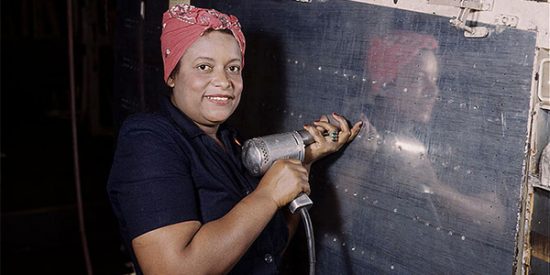Archive for September 2020
Labor Day Message from Oregon Tradeswomen’s Executive Director

Original photo by Alfred T. Palmer – Image credit to United States Library of Congress
The first Labor Day in the United States was celebrated in 1882, almost two decades before women had the right to vote and before the U.S. Department of Labor recognized the contributions of women to the Labor Movement by creating the Women’s Bureau. Nevertheless, women contributed to the Labor Movement before it was even called a movement.
Women like:
Mary Harris “Mother” Jones, who was once called the “most dangerous woman in America”, fought to protect child workers and push for enforcement of child labor laws. She became an organizer for the United Mine Workers and stood up to big companies and organized coal miners to demand better conditions for workers.
Velma Hopkins, an African-American organizer with Local 22 of the Food, Tobacco, Agricultural, and Allied Workers of America-CIO. She mobilized 10,000 workers in North Carolina to unionize R.J. Reynolds Tobacco Company.
Dolores Clara Fernández Huerta, a labor leader and civil rights activist who, with Cesar Chavez, co-founded the National Farmworkers Association, which later became the United Farm Workers. She was tireless in her fight for worker rights, immigrant rights, and women’s rights.
Frances Perkins who, having personally witnessed workers jump to their death during the Triangle Shirtwaist fire, helped to pass strong labor laws after becoming the first woman appointed to the U.S. Cabinet as Secretary of Labor in 1933.
Ai-Jen Poo who worked to organize domestic workers in 2000, and was key in the passage of the Domestic Workers Bill of Rights in New York. The bill legitimated domestic workers and gave them the same lawful rights as other employees, such as vacation time, and overtime pay.
Hattie Canty, the legendary African-American unionist was one of the greatest strike leaders in U.S. history. After her husband died, she raised eight children on her own and dedicated her life to improving the working conditions of others. She fought for a living wage and for the engagement of People of Color in the Labor movement. Her patient leadership helped knit together a labor union made up of members from 84 different nations!
The women noted here are just a few of the very many who made sacrifices for worker’s rights.
As we mark the 100th anniversary of the creation of the U.S. Women’s Bureau, Oregon Tradeswomen would like to honor them, and all who have fought and continue to fight for our nation’s workforce.
Oregon Tradeswomen is grateful for our partners in the Labor Movement, here in Oregon and across the country who work tirelessly for worker’s rights, dignity, and justice. We are with you in the fight today, and always, as today we honor our nation’s workers!

Kelly Kupcak, Executive Director
Oregon Tradeswomen